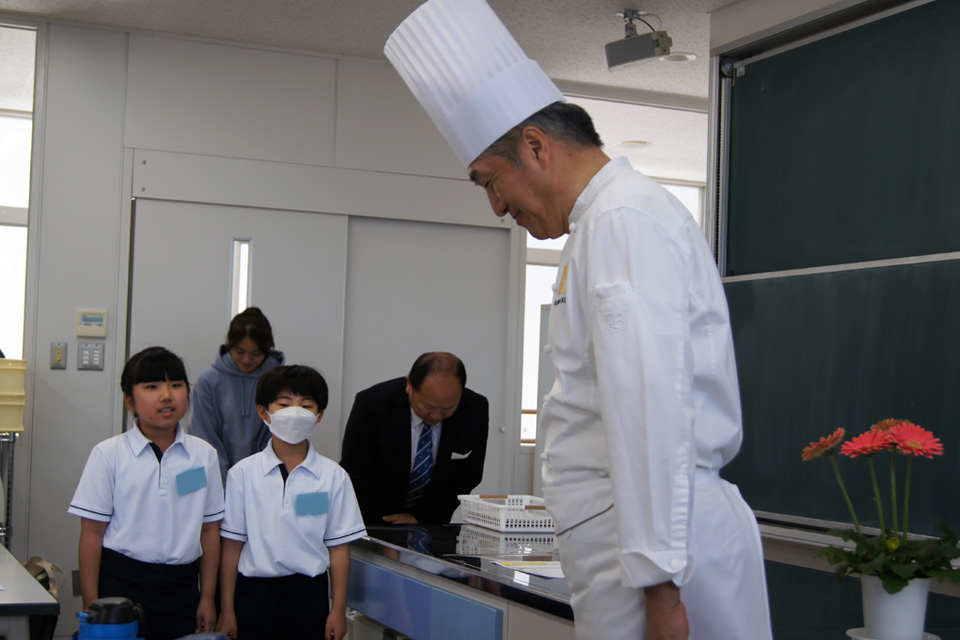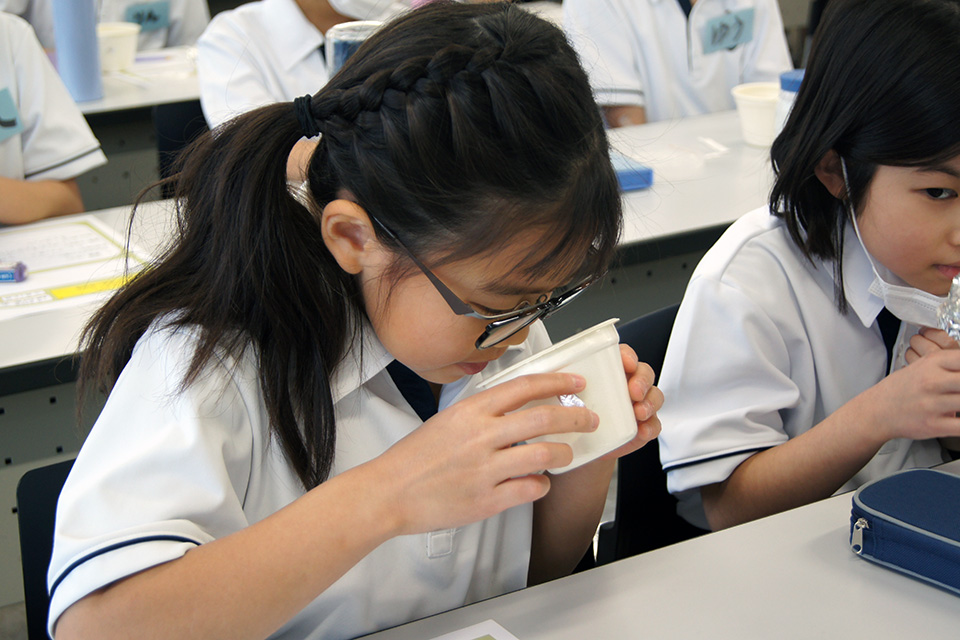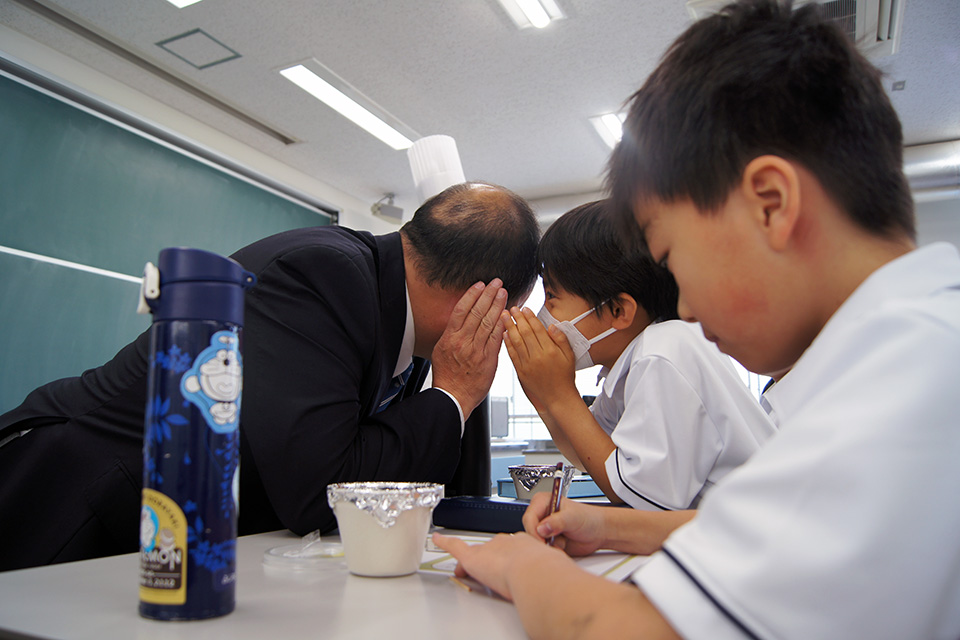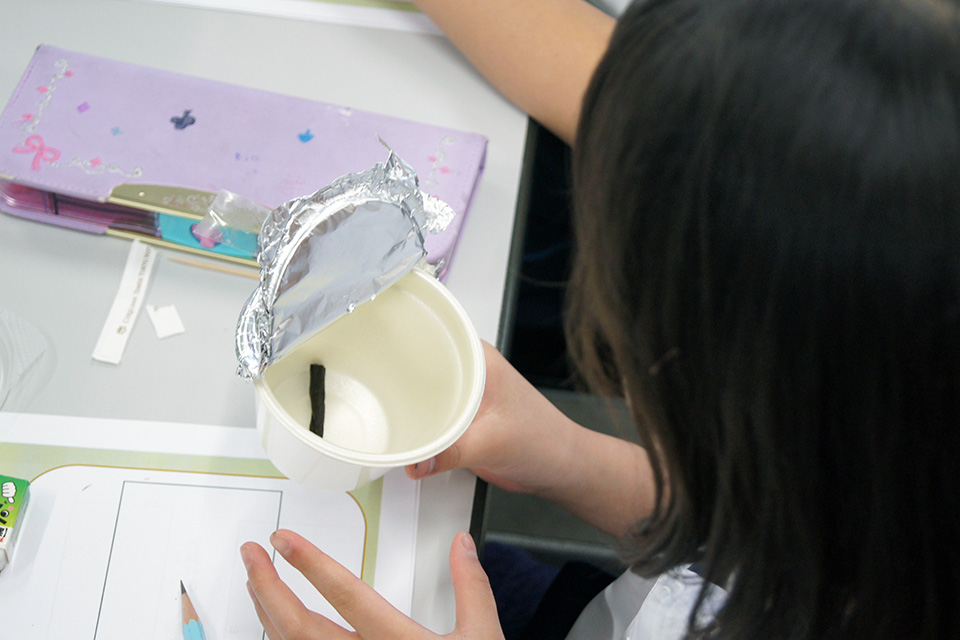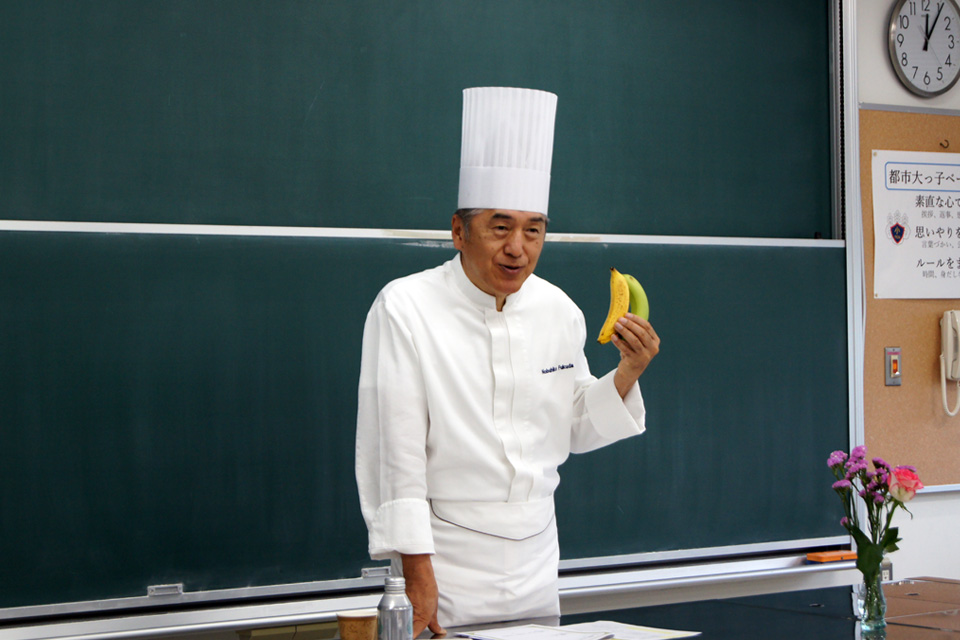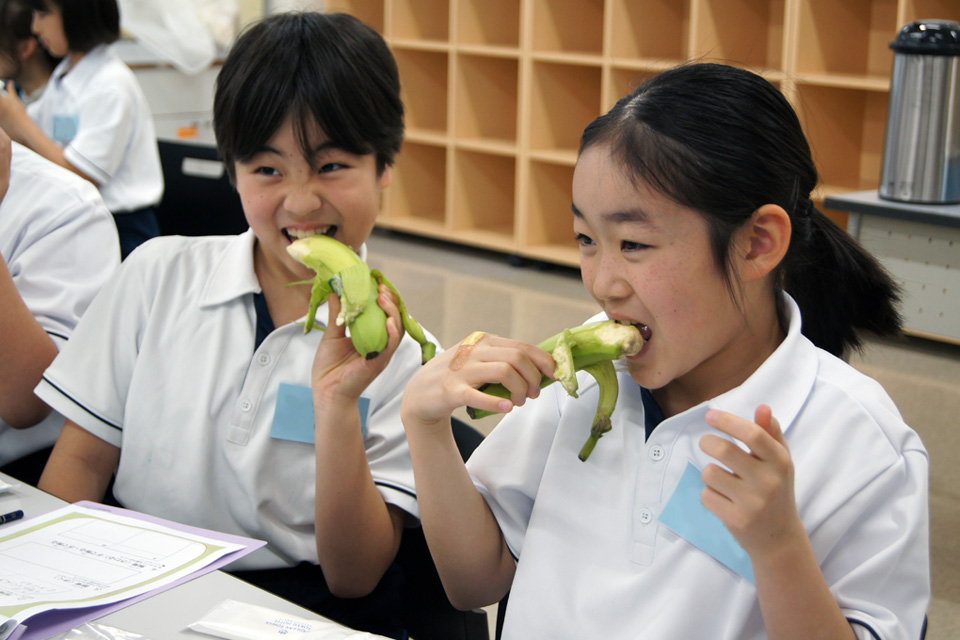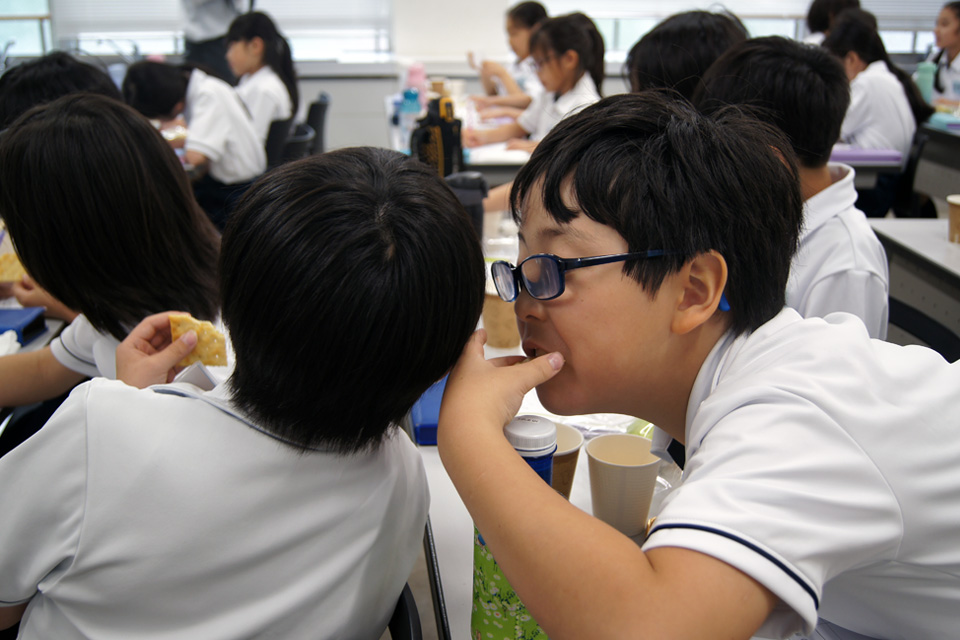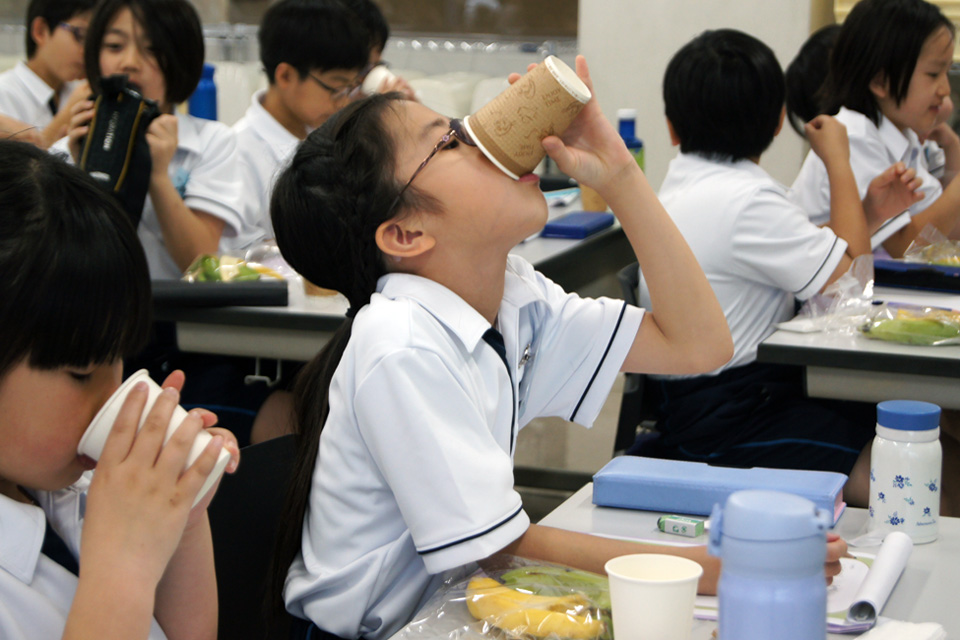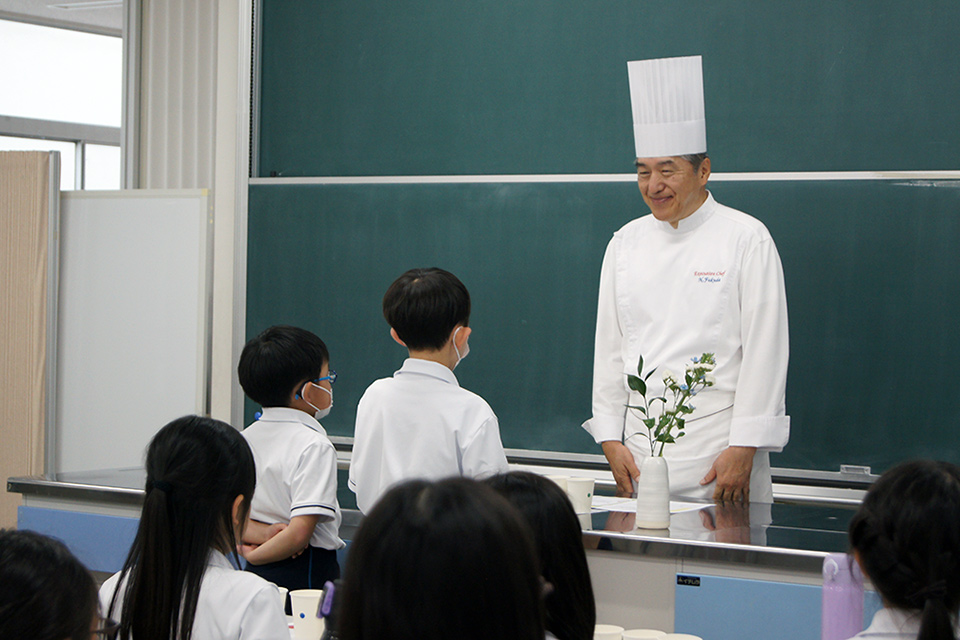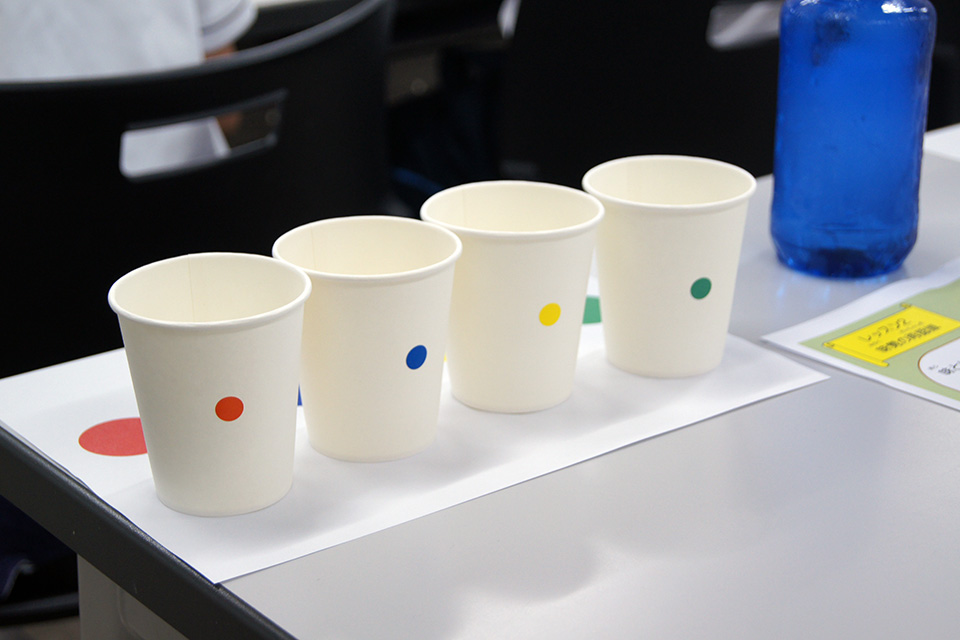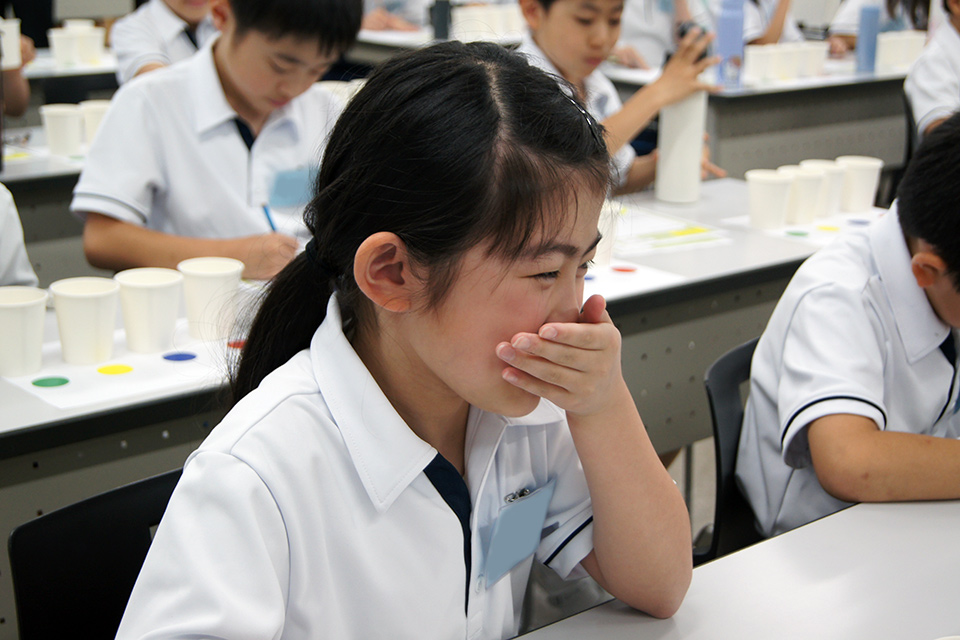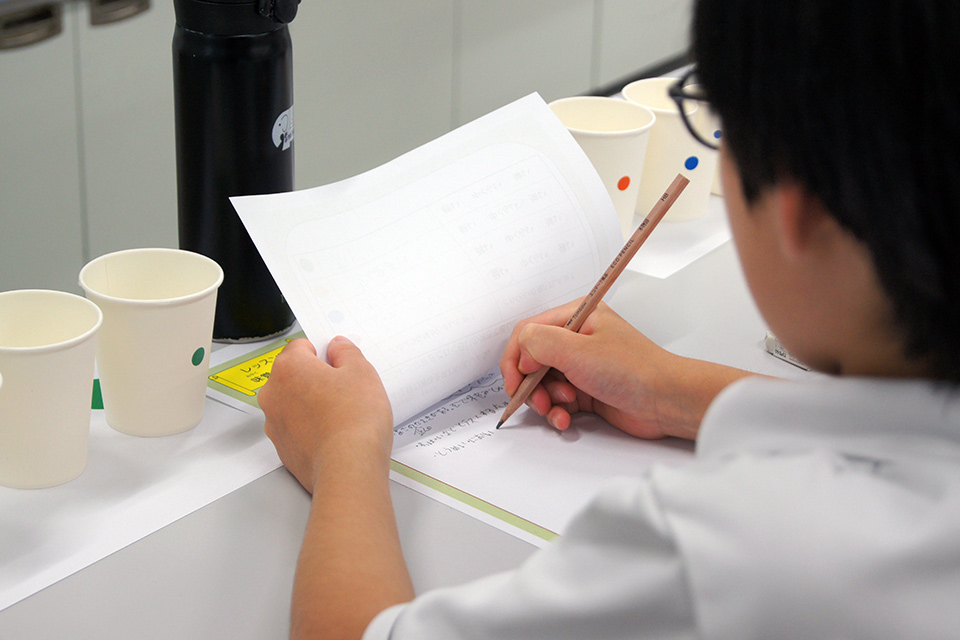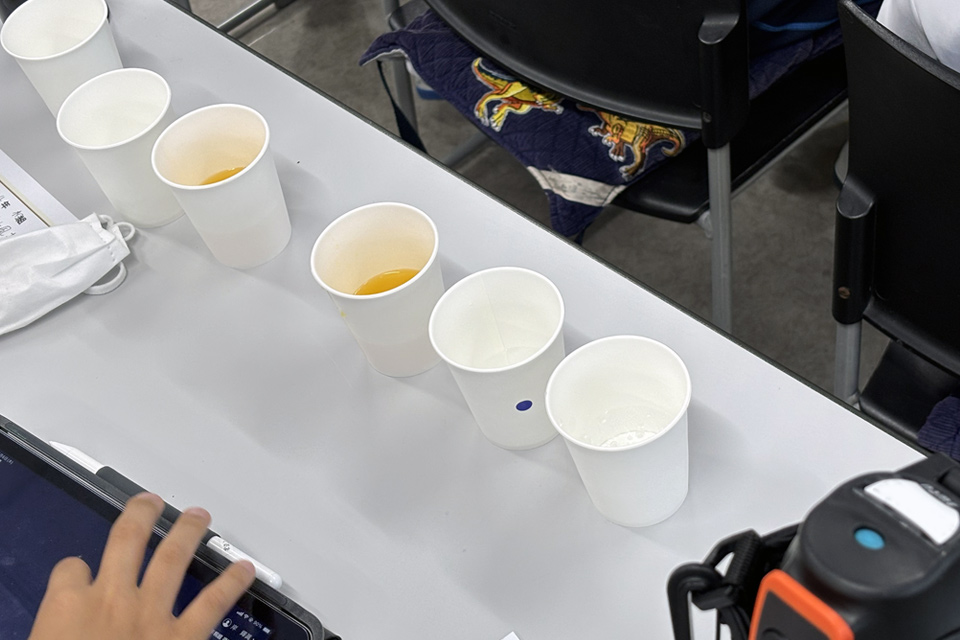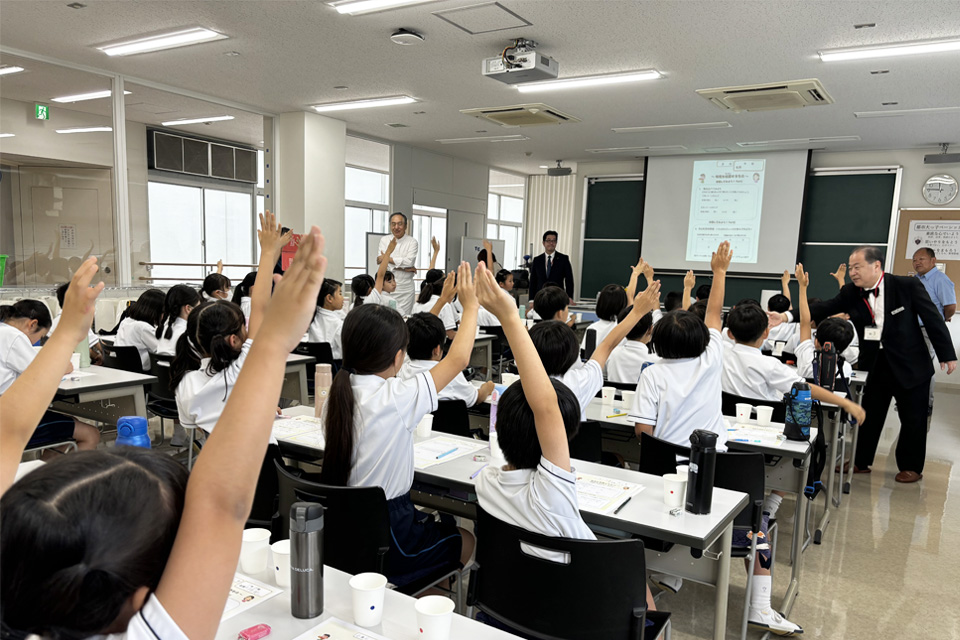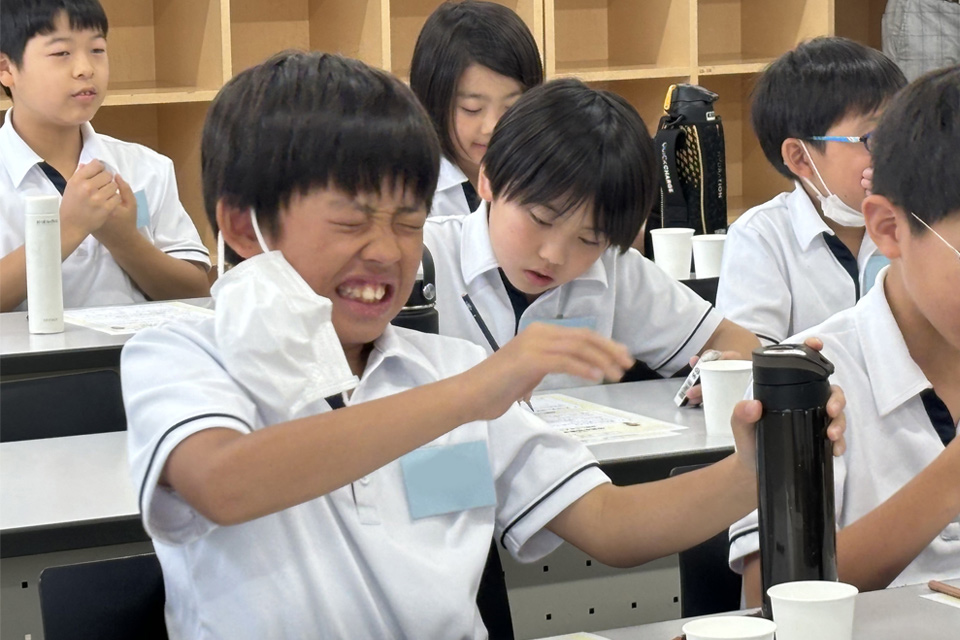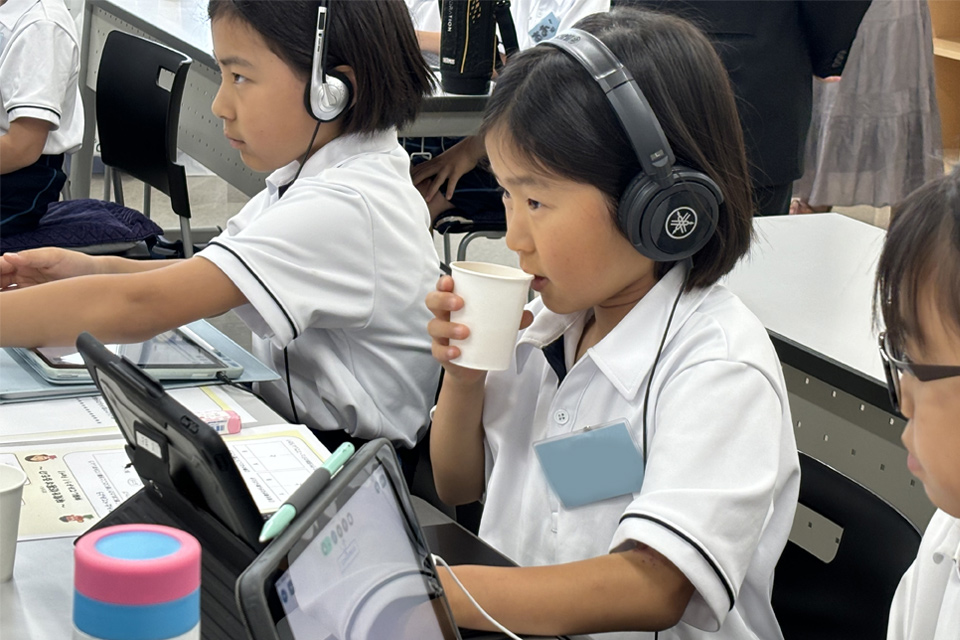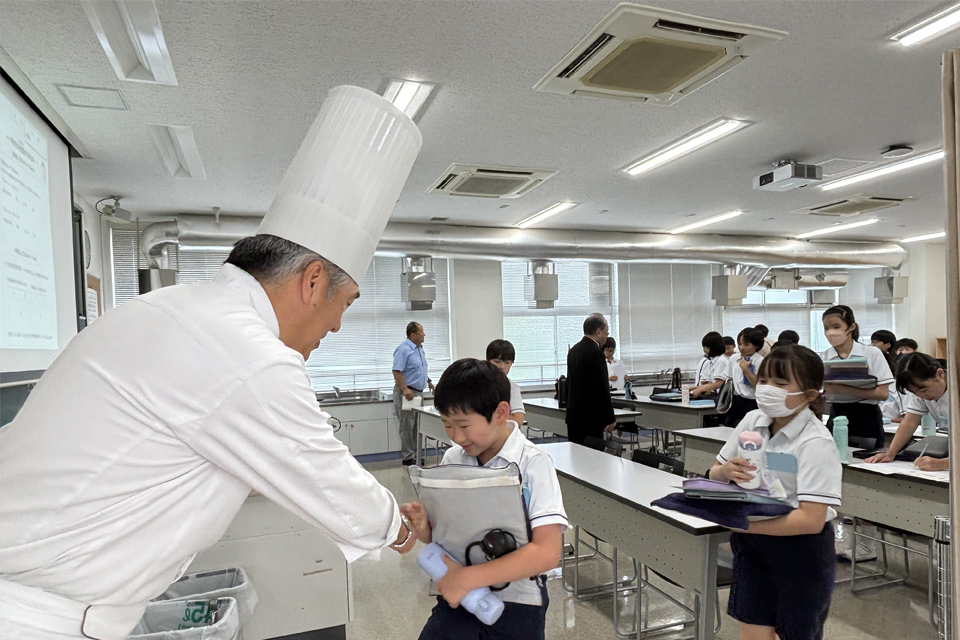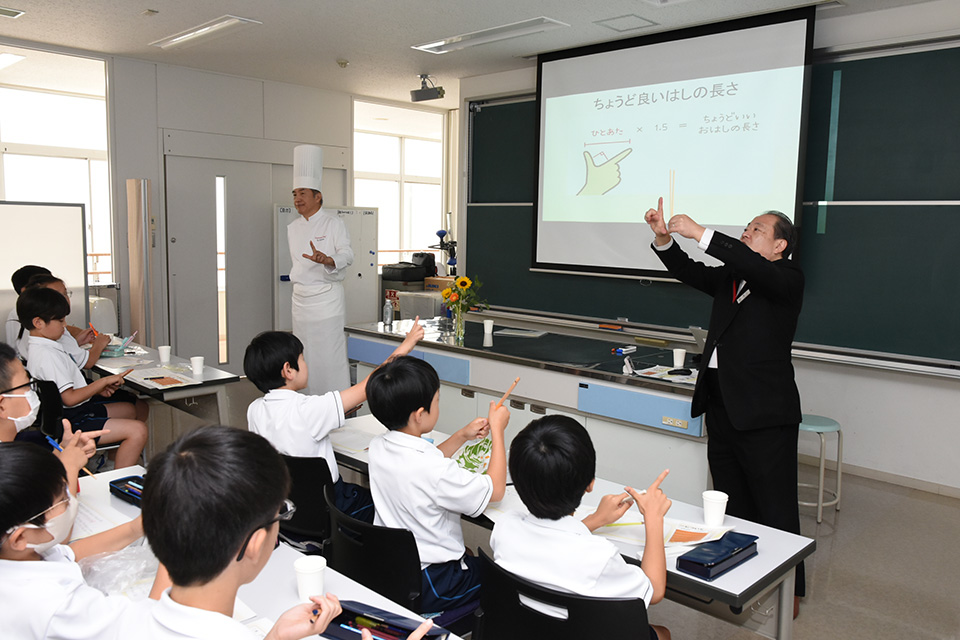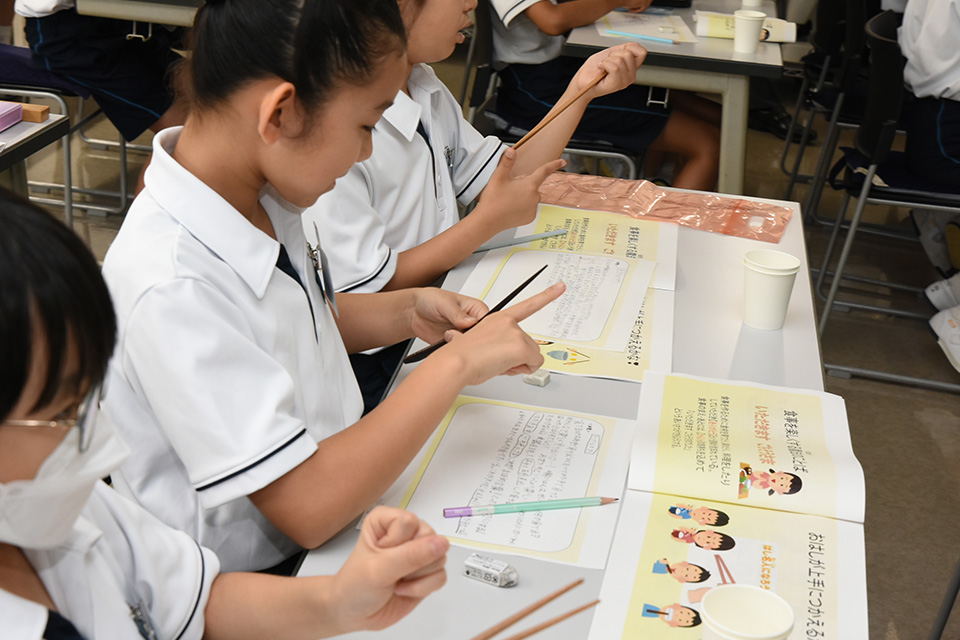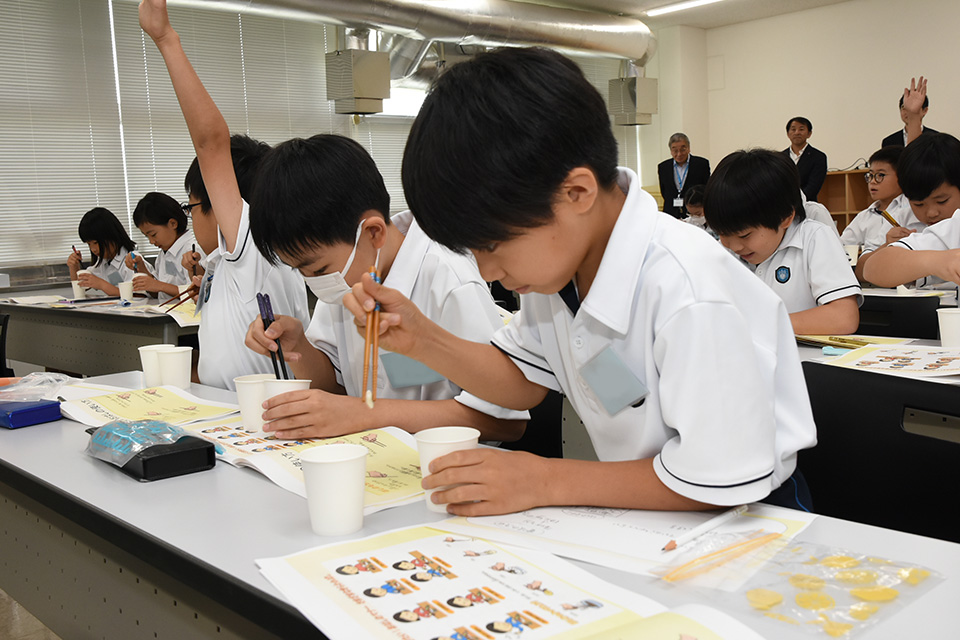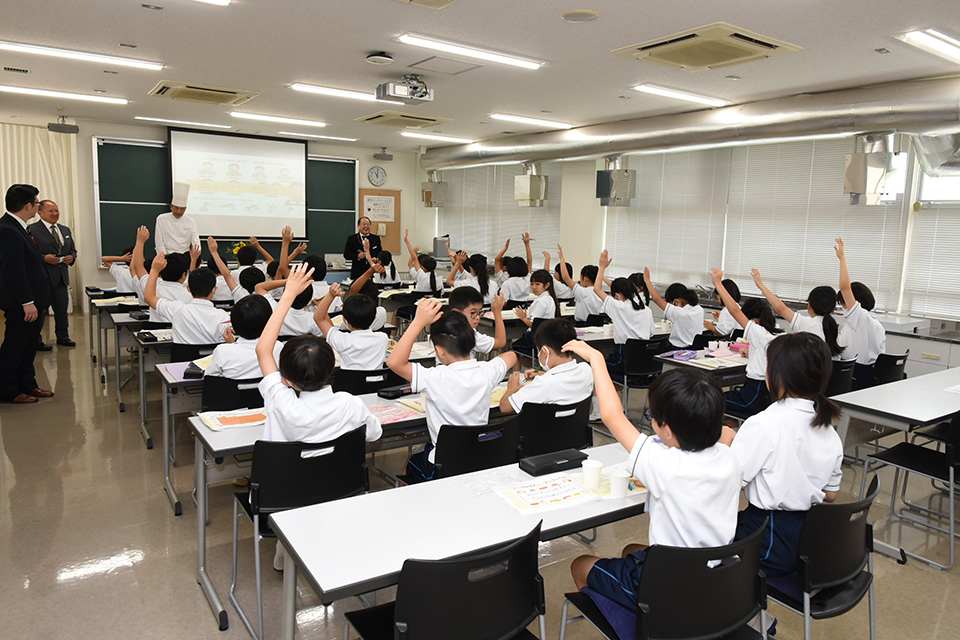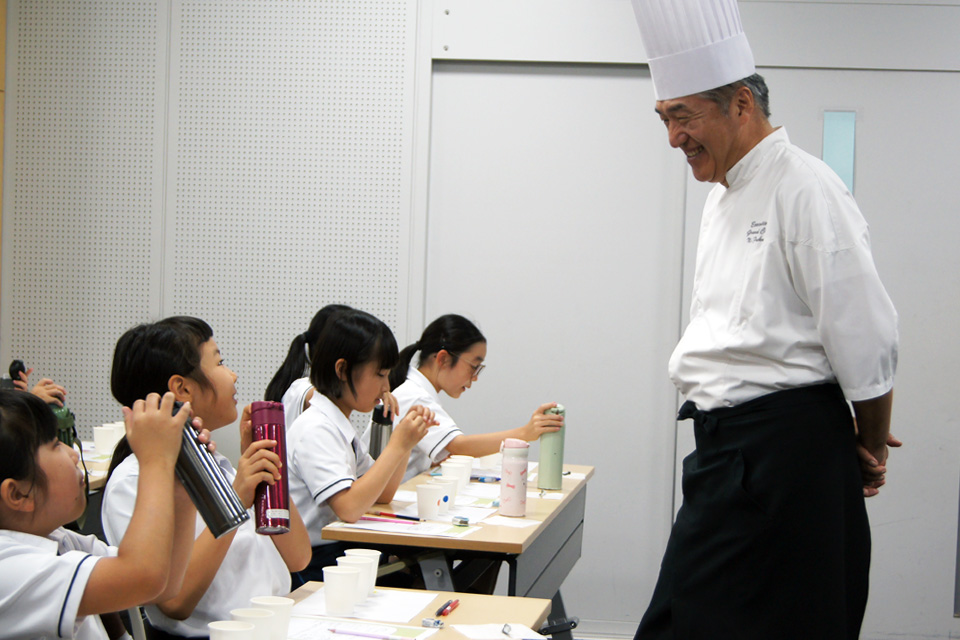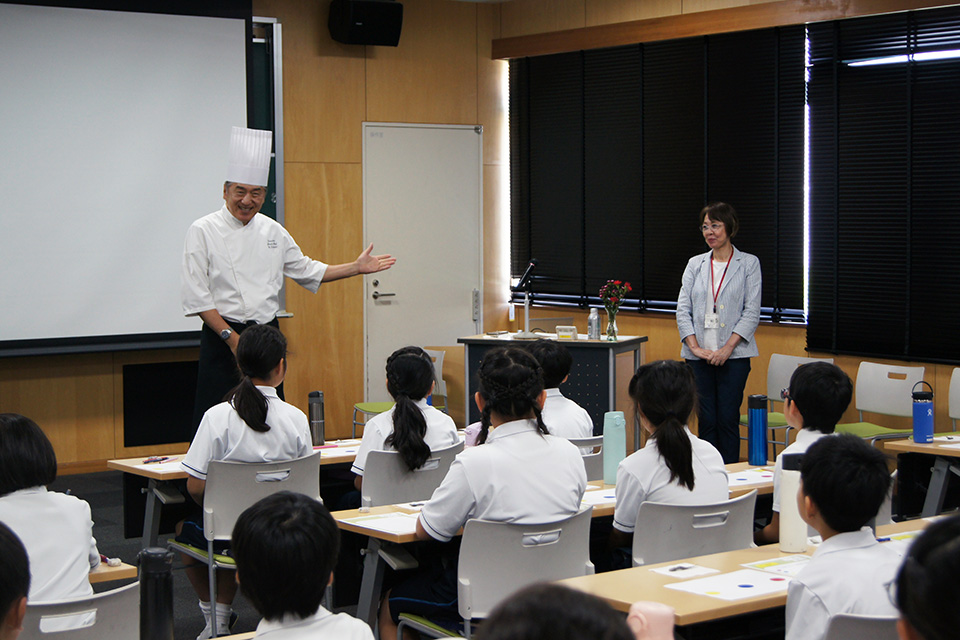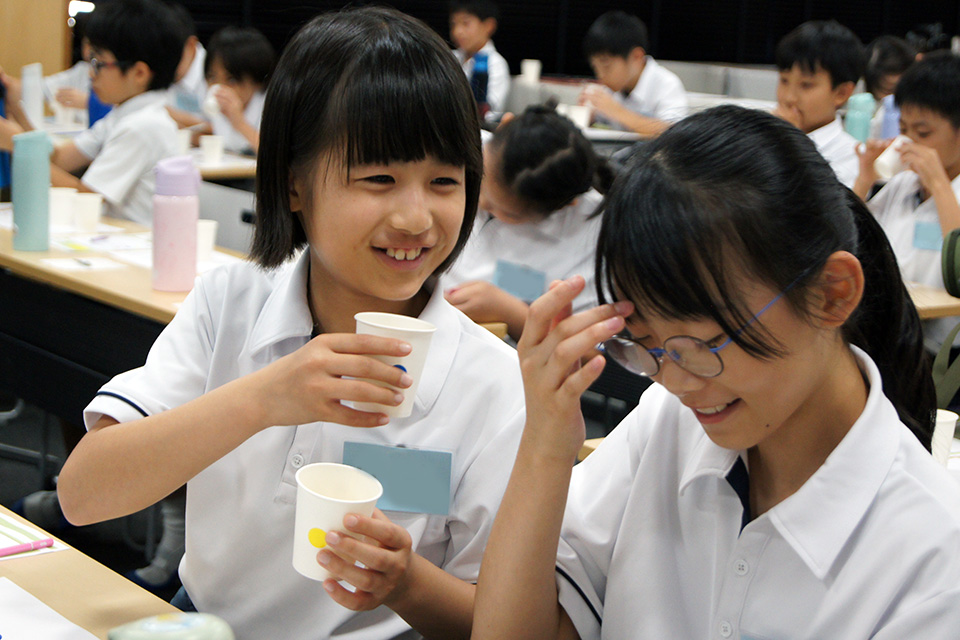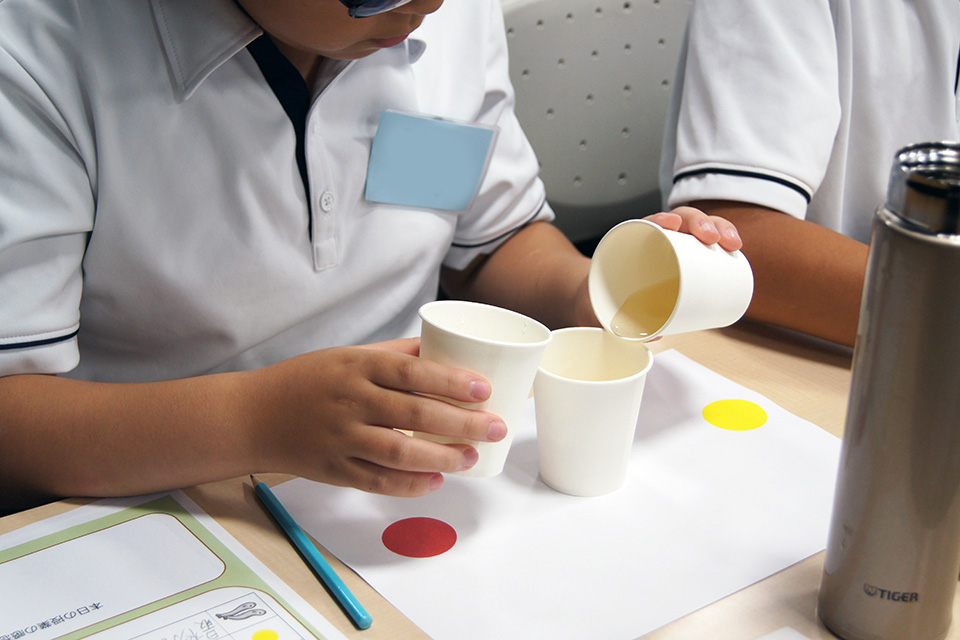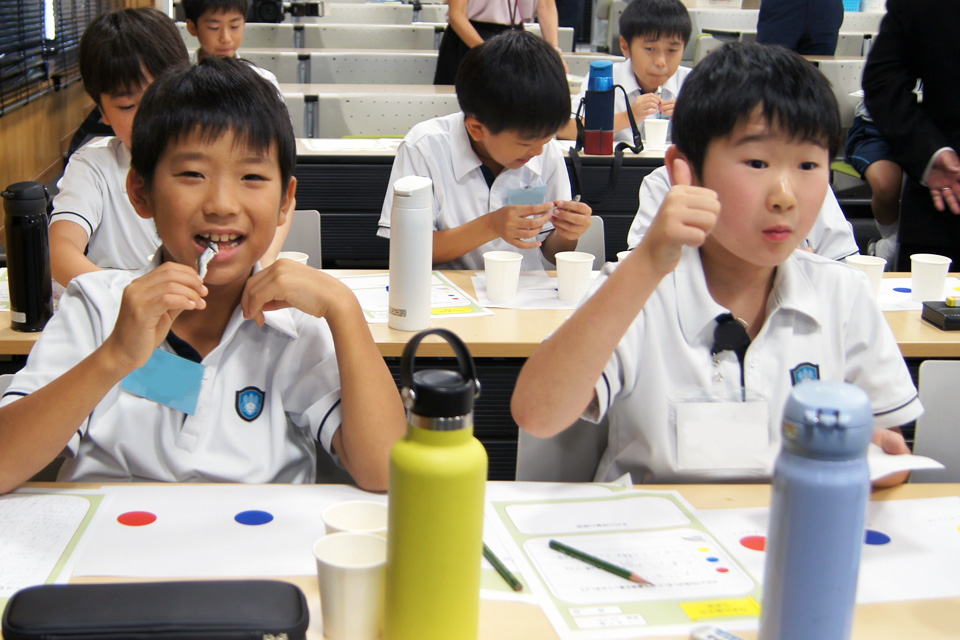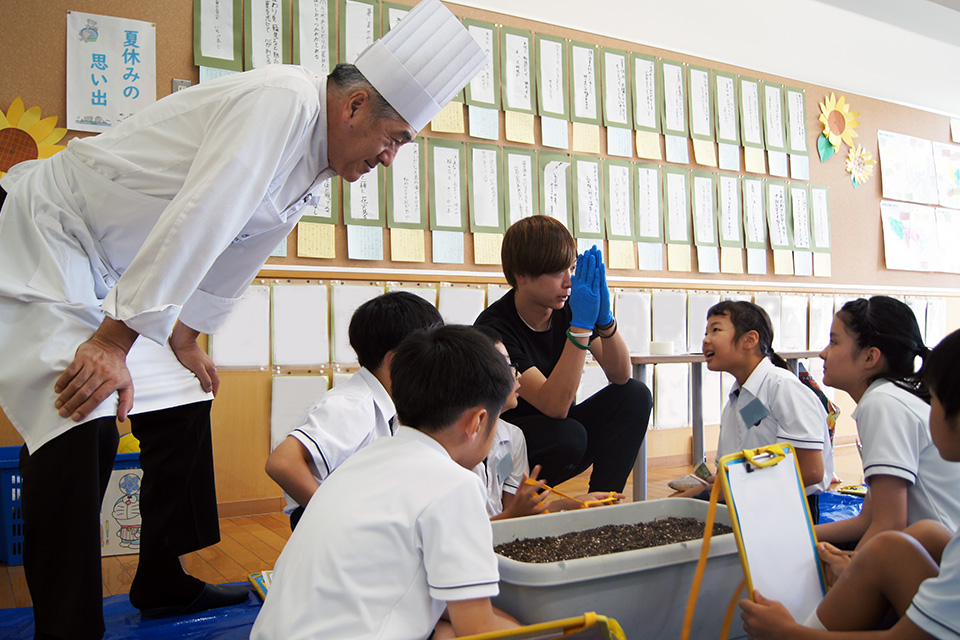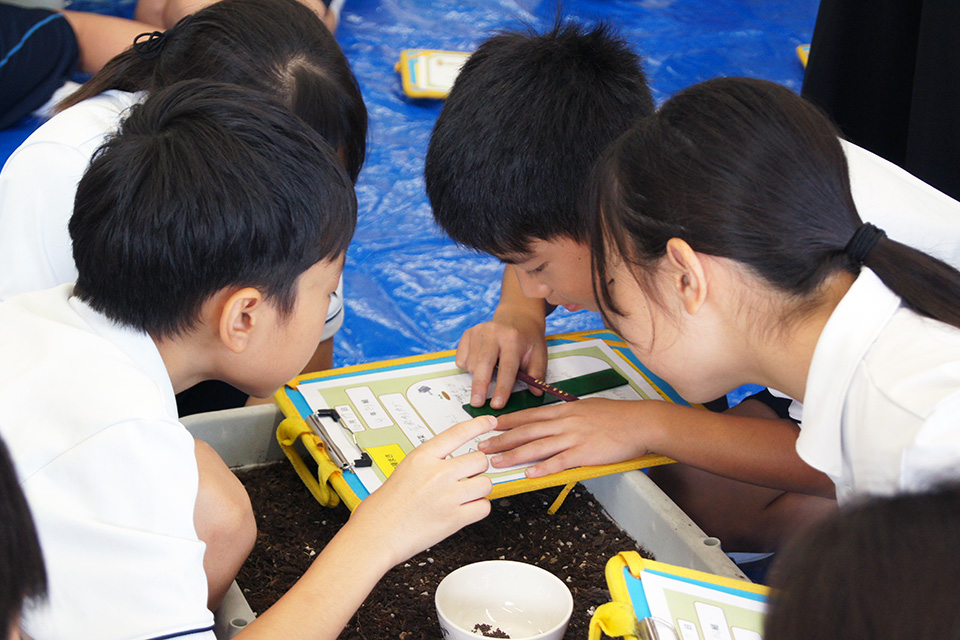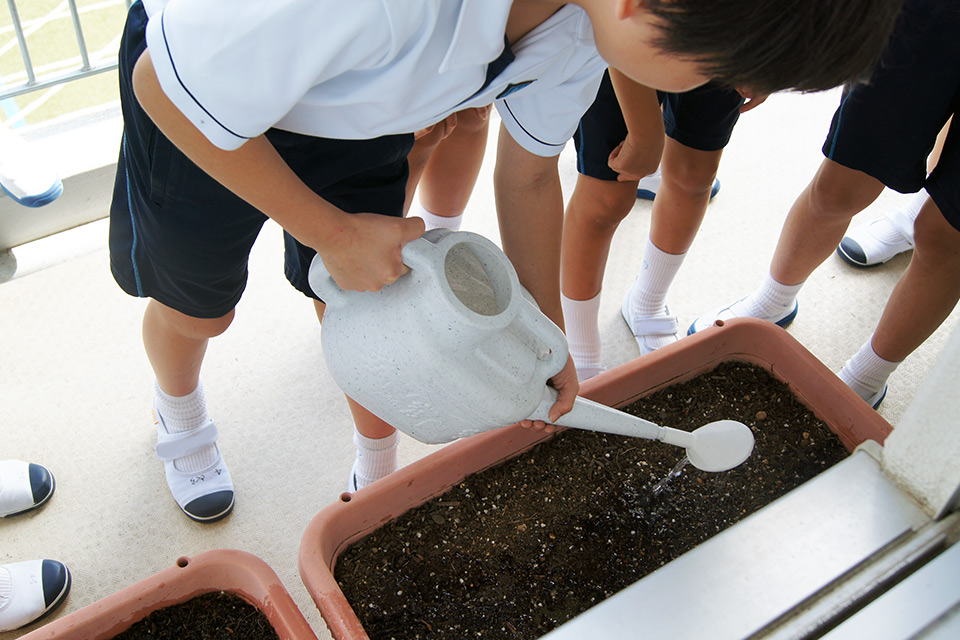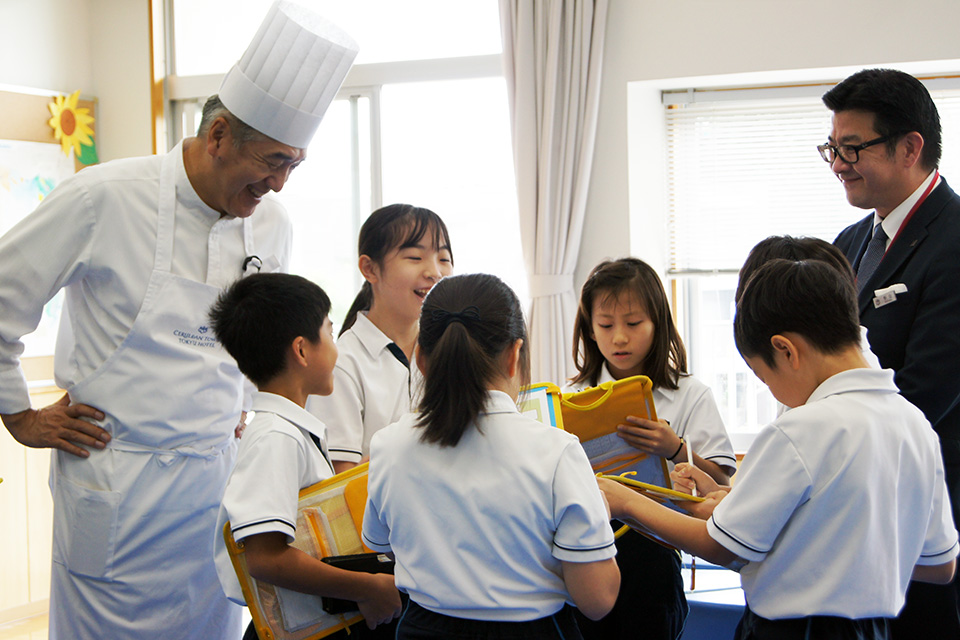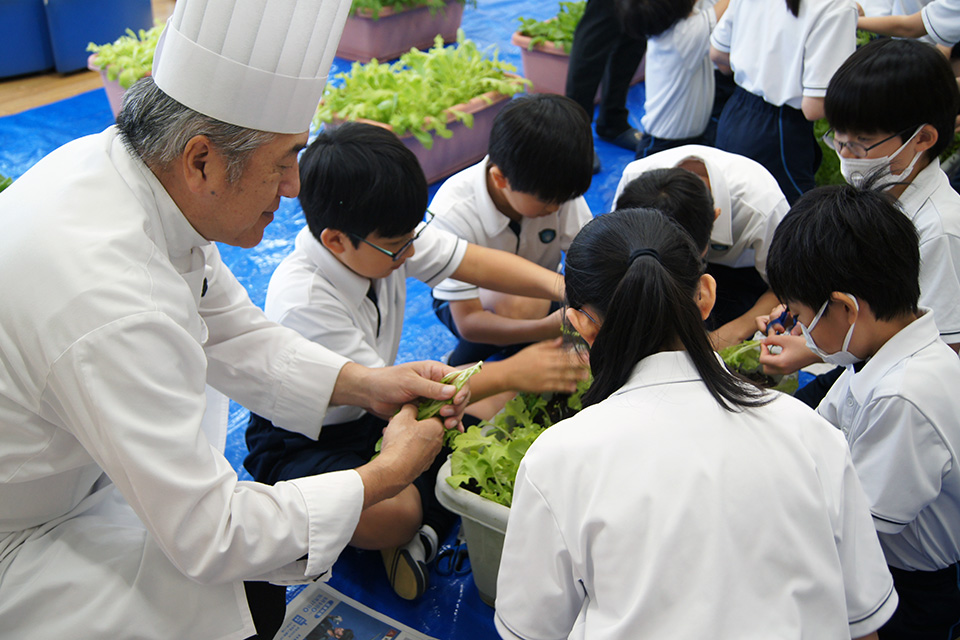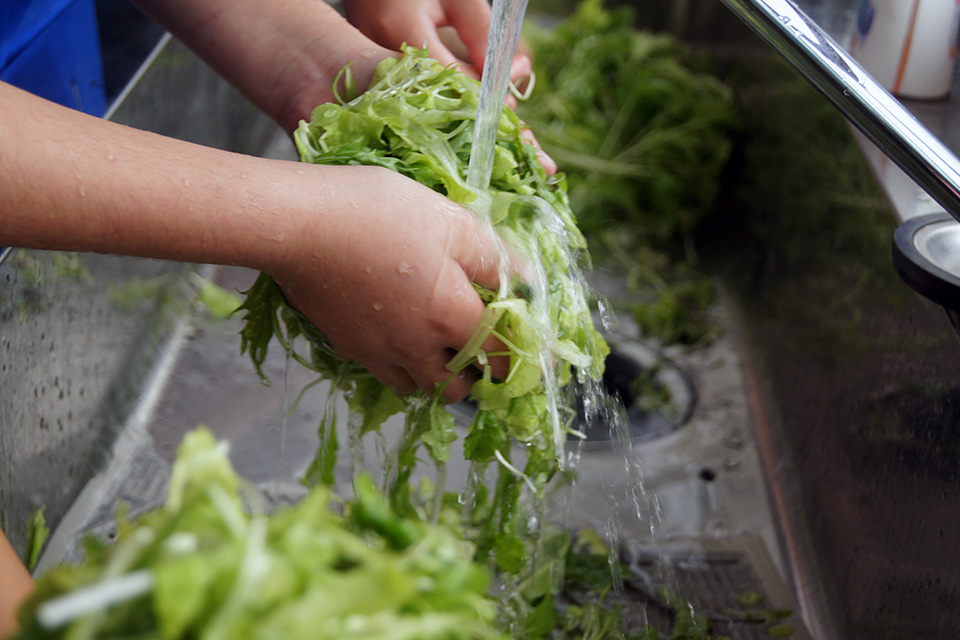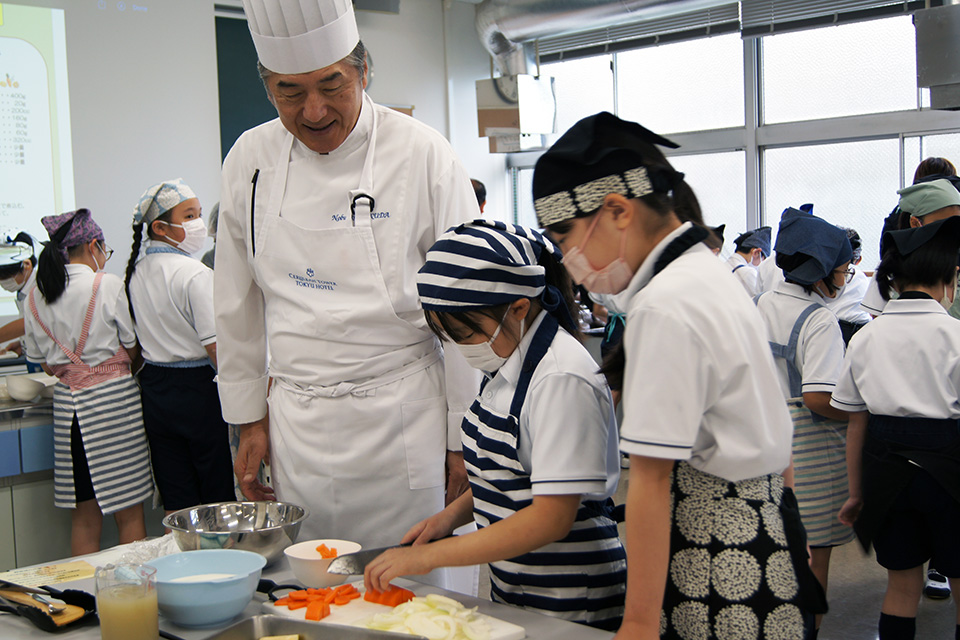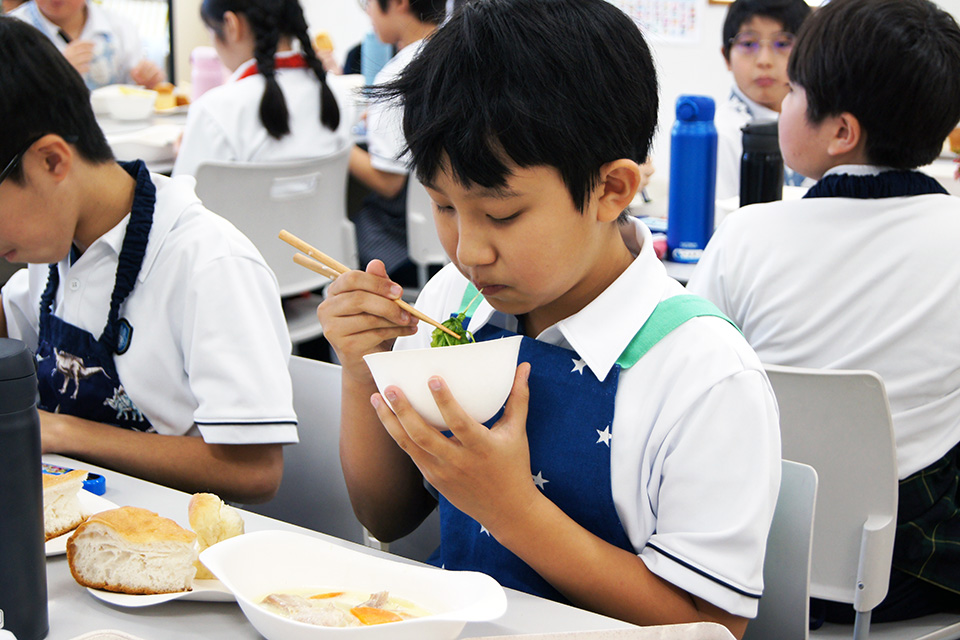Awaken children's five senses through food!
TOKYU HOTELS Executive Chef Yoshihiko Fukuda gives food education class at Tokyo University Elementary School
A total of 12 special lessons will be held for fourth graders with the aim of helping them develop healthy bodies and rich minds and humanity. Rather than simply listening and memorizing, the content will be fun and educational through experience and fieldwork, including the Japanese food culture of "umami" and how to select ingredients.
1st Lecture
About the Five Senses (Smell)
The first class of the year was held on April 16, 2024. Over the next year, we will be learning about food through the five senses.
The first theme is "sense of smell."
First, the children were given a cup of vanilla beans, each with a lid covering the contents.
The children made small holes in the lid and used their sense of smell to smell the confections. "It's vanilla ice cream!" and "It tastes like cookies!" they exclaimed, delighted by the sweet aroma unique to vanilla beans.
At the same time, we also heard honest and open-minded opinions such as, "It smells like gasoline" and "It seems bitter."
The children seemed nervous at first as the atmosphere was different from usual classes, but from the very first lesson they were able to put into practice the most important aspect of food education - writing down what they felt in their own words.
Instructor's comment
The most important thing in food education is to express in your own words what you feel through food. And then share that with others. The five senses are developed at the dinner table. When you get home, please talk to your family about today's lesson and share your impressions of dinner.
2nd Lecture
About the five senses (sight, hearing, touch)
The theme of the second session, held on April 22nd, was "sight, hearing, and touch."
This time we studied using bananas, crackers, and consomme soup.
Using unripe, blue-green bananas and the yellow bananas we are used to seeing, the children shared how they imagine their tastes based on their appearance, and the differences in the texture they feel in their hands and on their tongues.
The children looked worried at the blue-green bananas, saying, "They look bitter..." and their hunch was correct. As expected, the bananas were bitter and hard, but the children seemed to enjoy the new experience.
In the hearing experiment, the children focused on the sound of their friends eating crackers and distinguished the difference between the sound of the cracker being bitten and the sound of it being chewed.
Finally, we will taste consommé soup at different temperatures.
The children commented that the heated soup was "richer in flavor" and "more delicious!" than the room temperature soup, but in fact the flavor was the same.
I learned that the taste of food changes depending on the temperature.
Instructor's comment
Serving food at the right temperature so that it tastes delicious is one way of showing love and consideration for others.
When you get home today, be sure to thank your mom and dad for always cooking you delicious meals.
3rd Lecture
Taste and the four basic tastes
The theme of the third event, held on May 13th, was "Rediscovering Taste."
This time, we studied using aqueous solutions that were seasoned with "salty," "sour," "bitter," and "sweet."
The four types of water provided are colorless, transparent, and odorless, and contain only small amounts of certain ingredients compared to the large amount of water, so it requires great concentration to distinguish them.
It is said that judgment can change depending on psychological states such as tension and physical condition, so the children closed their eyes while tasting the solution.
The children showed keen reactions to the salty and sour tastes, saying, "It's seawater!" and "It tastes like lemon water!", but when they saw the solution containing the unfamiliar "bittern," they frowned and said, "What's this?!"
Compared to adults who are accustomed to bitter tastes through the consumption of luxury items such as alcohol and coffee, children are more sensitive to bitter tastes than adults because their defense instinct is activated when they encounter bitterness.
At this time of year, when even subtle flavors can be fully appreciated, it is important to develop a good sense of taste.
Instructor's comment
If you can sense the difference in taste with your tongue, you will be able to season your food well. Don't take for granted that your parents are making delicious meals for you, and always remember to be grateful.
4th Lecture
Something that interferes with taste
The theme of the fourth session, held on June 6th, was "Things that interfere with your sense of taste."
This time, we will be experimenting using mineral water, carbonated water, and mixed juice.
Things that interfere with taste include stimuli from the food itself and external stimuli such as appearance and sound. First, they compared mineral water and carbonated water, and shared their impressions and the strength of the stimulation. This was the first time the children had tried pure carbonated water, not something with a flavor like cola. As soon as they took a sip, they looked displeased and exclaimed, "It's bitter!" and "It tingles!"
Next, we experienced interference from external stimuli (noise).
We shared the difference felt when tasting mixed juice while listening to noise through headphones, and when concentrating only on the taste without any distractions. When trying to guess which fruits were used in the mixed juice, the correct answer rate was higher when concentrating than when tasting while listening to noise, and we were able to experience the theme of "things that interfere with taste" firsthand.
Instructor's comment
We have learned today that there are stimuli from the food we eat and external stimuli that interfere with our sense of taste, but our sense of taste also changes depending on our physical and mental state and our environment.
Four years ago, those of you who had just started elementary school probably experienced "silent eating" as a measure against the coronavirus. It's nice to enjoy a meal quietly by yourself, but food tastes best when you're talking with family or friends. Today, I drank juice while listening to noise, so it may not have tasted very good.
Whether you're having lunch at school or dinner at home today, be sure to enjoy some conversation while you eat.
5th Lecture
Table Manners
The theme of the fifth session, held on July 8th, was "Table Manners."
We learned everything from basic etiquette such as not resting your elbows on the table while eating and not talking with your mouth full, to things to be careful of when eating at a buffet or a course meal.
I also learned that the greeting "Itadakimasu" is a phrase we use to express gratitude to the producers, the people who prepare our food, the people who deliver it to us, and above all, the lives they have given to us. At the same time, I was reminded of the gratitude I feel for being able to eat without any inconvenience.
In the practical session, participants practiced using chopsticks correctly by competing to pick up three white beans in a cup and transfer them to another cup. At the suggestion of Executive Chef Fukuda, a championship match was held, which created a lot of excitement.
Instructor's comment
Today we learned about etiquette when dining at a restaurant or buffet, but the basics of etiquette are honed at home.
You will all go on to middle school and high school and become adults, but you should also learn manners other than those related to tables.
6th Lecture
Japanese Food Culture Umami
The theme of the sixth event, held on September 9th, was "Japanese Food Culture: Umami."
The children seemed to enjoy themselves throughout the class, which was their first in about two months since the summer vacation ended.
This time, we will be welcoming Masayo Waki, a cooking researcher active in various media, to learn about Japanese food culture and umami.
"Umami" is the fifth basic taste after "sweet," "sour," "salty," and "bitter" in "washoku," a taste that has been registered as an intangible cultural heritage by UNESCO. Since ancient times, the Japanese have been able to achieve a diet low in animal fats and oils by making good use of "umami," which, along with a meal style based on one soup and three side dishes, has helped to promote longevity and prevent obesity. To find out exactly what umami is, a taste that Japan is so proud of, we will actually taste some dashi soup.
The children were given three types of soup stock: kelp soup stock, and a combination of kelp and bonito flakes (with and without salt). The combination soup stock seasoned with salt was the most popular, with many saying it was the tastiest! However, the children enjoyed each of the "first soup stocks," which made the most of the flavors of the ingredients.
Finally, we sampled dried sardines, an ingredient packed with umami. The more you chew them, the more umami comes out, and the children adorable commented, "I want to eat it again as a snack!"
Instructor's comment
Today, we learned about umami, a taste that Japan is proud of around the world. We imagined the taste of the dashi soup from its color and aroma, and felt the temperature with our tongues when we drank it. We were able to fully utilize the five senses that we have learned so far and think about and experience umami. Not only was we able to study taste by using the additive-free ichiban dashi soup stock, but we should also always be grateful and not take our daily meals for granted.
7th Lecture
Autumn sowing
The theme of the seventh session, held on October 7th, was autumn sowing.
They spent about a month growing five kinds of vegetables - leaf lettuce, lettuce mix, mizuna, turnip, and arugula - and making them into salads in the cooking class in November. This time, they welcomed Kazuya Yui, representative of VEGRIA FARM, as their instructor, and learned how to sow and grow each seed, as well as their characteristics.
Placed in front of the children was potting soil that had been mixed with palm bark to promote air circulation and fertilizer. They touched the soil with their hands to check its condition, and carefully planted the seeds one by one.
One child was seen using a ruler to measure the size of the seeds, asking, "How big is the seed?" Other questions that the children asked enthusiastically included, "How long should I wait for the seeds to sprout?" and "What is the germination rate?"
The trick to watering is to water evenly so that puddles do not form. Also, suppress the urge to give lots of water to help the vegetables grow, and give the right amount of water according to the weather.
The key to their growth is to water them properly every day. The children listened to the explanation with serious expressions on their faces, knowing that they would be able to enjoy the delicious vegetables in the cooking class one month from now.
Instructor's comment
Food that you grow yourself will surely taste better than usual, and you'll never forget the taste.
On the days when you are in charge of watering the vegetables, be sure to share with your classmates how they are doing that day. And even on days when you are not in charge, keep an eye on the vegetables and help them grow with love.
8th
Cooking class
The eighth lesson, held on November 11th, was the long-awaited cooking class! The vegetable seeds planted in October have grown beautifully thanks to daily watering. There were some signs of insect bites, but this is also proof that the vegetables were grown without pesticides. The children enjoyed the taste of the vegetables they had worked so hard to grow by making them into a salad. The children carefully picked each one.
Once the harvest is over, it's time to start cooking. This time, in addition to making a salad using freshly harvested vegetables, we will also be making pork stew in cream.
First, Executive Chef Fukuda gave a demonstration, where the children learned the cooking process and developed an image of the finished product. Once the cooking began, the children were enthusiastic, encouraging each other as they worked in a friendly atmosphere. The creamed pork stew was flavored with the vanilla beans used in the first lesson, giving it a fragrant finish. The salad was simply seasoned to bring out the natural flavor of the vegetables.
When the children tasted the vegetables they had grown themselves, they exclaimed in amazement, "They're sweet!" and even children who are usually small eaters managed to finish them all.
Enjoying the vegetables that had been grown with so much love was a valuable experience that allowed us to once again feel grateful for food.
Instructor's comment
From sowing the seeds in October to today's cooking class, the students learned firsthand the importance of dividing up roles, the importance of being grateful for ingredients, and the difficulty of growing food.
When tasting food, instead of just saying it's delicious, pay attention to the taste and aroma you notice. Furthermore, sharpen your senses to know what ingredients are used and tell your friends about it.
9th
Christmas and sweets
The theme of the 9th event, the last of the year, held on December 16th, was "Christmas and Sweets."
We learned about the types of sweets and breads that are popular at Christmas around the world and their origins.
The children were very interested in sweets with names that are not very familiar in Japan, such as panettone and kougelhopf.
It was very impressive to see them diligently taking notes while drawing illustrations.
When asked, "What kind of cake do people often eat at Christmas?" the children answered enthusiastically, "Shortcake!"
So this time, we tried strawberries, an essential ingredient in shortcake. Because the scorching heat from summer to autumn had caused poor growth of strawberries, we had the opportunity to compare the taste of four different types of strawberries: ripe, unripe, frozen, and freeze-dried.
Before tasting the food, the children carefully observed the smell and appearance. It was clear that they had firmly acquired the habit of being aware of their five senses.
At the end, stollen was distributed as Christmas presents, and the children were delighted with this unexpected surprise.
The 9th lesson concluded with a cheerful greeting of "Happy New Year!"
Instructor's comment
Today, I had the valuable opportunity to hear directly from someone who produces our ingredients.
You all grew vegetables in class, but there are people who grow everything. Don't forget that and always be grateful.
You also took notes today on many of your impressions, so please continue to read them over and reflect on the class.
10th
Let's check out the ingredients
In the 10th class, the students went on a field trip outside of school.
11th Lecture
Gratitude for life (Hand-opening sardines)
The taste class, which has been held since April and has included a variety of experiences, only has two sessions left.
At the 11th "Thanks for Life (Hand-Opening Sardines)" event held on February 17th, participants used all five senses to open, cook, and taste sardines.
For many of the children, this was their first time opening the sardines by hand, and they were a little hesitant to touch them at first.
Sardines, as the name suggests, are said to be very delicate and weak fish.
The children worked carefully, careful to not damage the soft flesh, as they gently opened each one.
The seasoning is simple, with just salt and pepper to bring out the flavor of the ingredients. As it is cooked in a frying pan, it sizzles and releases a savory aroma.
When they try to flip it using a spatula, the flesh falls apart, and they can't help but exclaim, "Ah!"
The children struggled but managed to bake the cookies carefully.
When the long-awaited tasting began, a variety of reactions were heard, such as, "Maybe it was a bit too salty?" and "There's no odor!"
The texture of the sardines when they are opened, the sound of them grilling, the fragrant smell that rises, and the taste when you taste them.
It was a true culmination of all that they had learned, allowing them to use their five senses and experience the joy of creating something with their own hands.
Instructor's comment
The sardines that you all ate today were caught by fishermen at the risk of their lives in the bitter cold of midwinter. Those sardines also have lives, and we should be grateful for the lives we have been given.
Also, the fact that he is able to eat normally, not just today, is thanks to his parents and the people around him.
Of course, you should not waste any food and should enjoy every bit of it, but also remember to be grateful for the life you have been given and to be thankful for those who support you.
12th
Sharing fun times at the graduation ceremony
The 2024 Food Education Program Graduation Ceremony was held in the ballroom of CERULEAN TOWER TOKYU HOTEL on March 4th.
First, they looked back on the past year's lessons by theme. The children listened intently with serious expressions on their faces, nodding occasionally and seeming to be thinking back on the lessons.
The final sample handed out were orangettes made using recycled orange peels squeezed at the hotel.
As the children savored each bite, they seemed to once again realize the importance of food, in response to Executive Chef Fukuda's words, "I want you to make the most of every ingredient and never waste anything."
Next, the children were presented with their certificates and top hats. They happily put on their top hats, saying, "My teacher and I are wearing matching hats!" They also naturally broke out into smiles as they shook hands with Executive Chef Fukuda.
The children then gave a gift of singing a choir to express their gratitude for the past year. It was impressive to see them swaying their bodies and singing with all their might.
Throughout the year, Executive Chef Fukuda repeatedly conveyed the message to everyone to "always be grateful."
Comments from the children, "Through these various experiences, I have learned to be grateful to my family and the people around me," spoke to the great success of the program.
At the end, he made eye contact with each person, smiled, and gave them a high-five.
The 2024 Food Education Program has come to a close.
Instructor Profile

Nobuhiko Fukuda
Executive Managing Director, TOKYU HOTELS & RESORTS CO., LTD.
Executive Chef TOKYU HOTELS Executive Chef of CERULEAN TOWER TOKYU HOTEL


